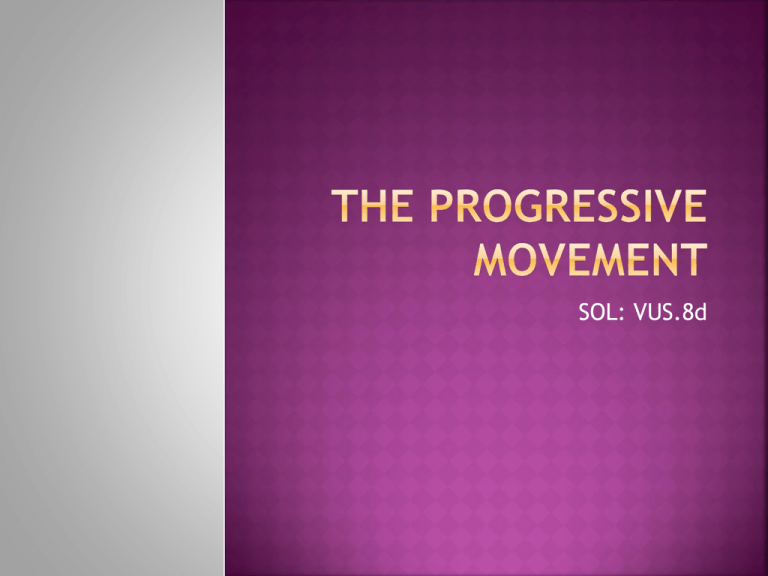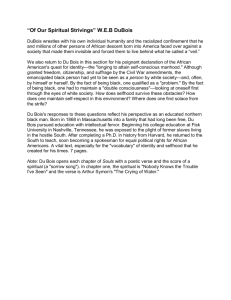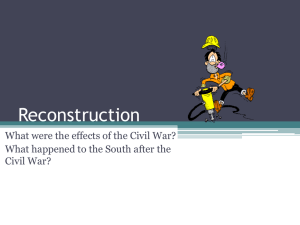The Progressive Movement
advertisement

SOL: VUS.8d Progressives: Americans who want to improve the “system” by working together with the government Many social problems arose from industrialization (i.e. poor living/working conditions, corrupt business practices, government controlled by the wealthy) Dangerous conditions Child labor Long hours, low wages, no benefits or security Company towns Employment of women Towns based on a single factory-the company often supplied all aspects of living The First Company Town was in Lowell MA. All aspects of life were conducted in the company-owned town, including its own church! writers who brought attention to corruption Muckraking literature told of the abuses of child labor Upton Sinclair’s book The Jungle exposed the meatpacking industry Government controlled by the people Guarantee economic opportunities through government regulation Eliminate social injustices In local governments New forms to meet needs of increasing urbanization (commission and council manager) In state governments Referendums-laws submitted to the people for a vote Initiatives-laws can be originated by the people Recall-removing an official from office by the people’s vote In Primary Elections-people choose candidates for public office 17th amendment- direct elections of Senators Secret Ballot In elections Child Labor Child labor laws Purpose: protect workers rights by banding together as a Union Organizations Knights of Labor (1st large labor union for all races) American Federation of Labor (Skilled craftsmen led by Samuel Gompers) American Railway Union (Railroad workers led by Eugene Debs) Industrial Ladies’ Garment Workers Union Haymarket Square Homestead Strike 1886- confrontation between striking workers and police resulted in several deaths 1892- steel workers against Carnegie fought hired “thugs” Pullman Strike 1894- Debs’ workers were attacked by “strike breakers” resulting in President Cleveland sending out troops Union Gains Limited work hours Regulated work conditions Antitrust laws Sherman Anti-Trust Act: prevents any business structure that “restrains trade” (no monopolies) Clayton Anti-Trust Act: expands Sherman Act; outlaws price-fixing; exempts unions from Sherman Act Forerunner of modern protest movement Benefited leadership from strong (Susan B Anthony) Encouraged women to enter labor force during WWI Resulted in 19th amendment Women celebrate the passage of the 19th Amendment granting them the right to vote: Aug 26, 1920. •16th Amendment: Income Tax •18th Amendment: Prohibition •Meat Inspection Act •Pure Food & Drug Act •Conservation (National Parks) Carry Nation worked for prohibition by walking into saloons, destroying bottles of liquor with her hatchet, and scolding the customers She led an anti-lynching crusade and called on the federal government to take action. Congress failed to make such a law, however a great deal of public awareness was raised! Photo credit Library of Congress Photo credit Library of Congress Born into slavery shortly before emancipation, Wells was raised in a wellrespected and politically active family. She moved to Memphis and became an editor of a local paper, and she regularly reported racial injustice. This led to her later crusades. Lynching became far too common of an offense for Wells to take lightly. She denounced it as mob rule and a violation of rights, including the crime of murder. Ida B. Wells led an anti-lynching crusade and called on the federal government to take action. While many times the issue came before Congress, anti-lynching laws were never enacted at the National Level. He believed the way to equality was through vocational education and economic success; he accepted social separation. Economic success would precede social equality! Photo credit: Library of Congress Booker T. Washington was a former slave. He believed that racism would end once African Americans acquired useful labor skills and proved their economic value to society. Washington, who was born a slave in Virginia, graduated from Hampton Institute after his emancipation. He opened his own school in Alabama, the Tuskagee Normal and Industrial Institute. Washington pushed curriculum based on farming and technical training. "No race can prosper until it learns that there is as much dignity in tilling a field as in writing a poem." Booker T. Washington believed the way to equality was through vocational education and economic success; he accepted social separation and discouraged animosity between the races. He urged cooperation between the races. Washington did not want to "rock the boat" as he feared racial backlash would take back the few gains already made in the Civil Rights movement. Photo credit: Library of Congress He believed that education was meaningless without equality. He supported political equality for African Americans by helping to form the National Association for the Advancement of Colored People (NAACP). W.E.B. Du Bois became the first African American to receive a Ph.D. from Harvard in 1895. "The honor, I assure you," he said, "was Harvard's". Born to a middle-class family in Massachusetts, Du Bois believed blacks should seek a liberal arts education so that the African American community would have well-educated leaders. Toward this end, Du Bois proposed that a group of educated blacks, the most "talented tenth", would achieve immediate inclusion into mainstream American life. This would then pave the way for others to follow. Du Bois was much more militant than Washington, advocating non-compliance with laws and openly defying the authority which was in place. W.E.B. Du Bois believed that education was meaningless without equality. He supported political equality for African Americans by helping to form the National Association for the Advancement of Colored People (NAACP) in 1909.






